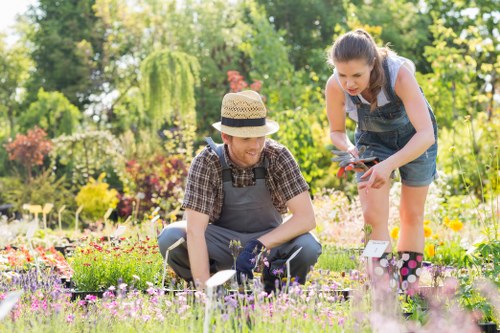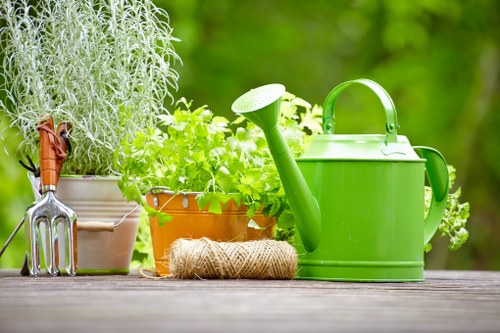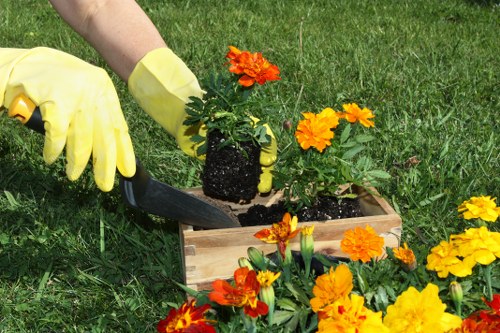Landscape Gardening in Covent Garden

Introduction to Landscape Gardening in Covent Garden
Covent Garden, nestled in the heart of London, is renowned not only for its vibrant arts scene and historic market but also for its exquisite landscape gardening. The blend of traditional charm and contemporary design makes it a prime location for garden enthusiasts and professional landscapers alike. Whether you’re a homeowner looking to transform your outdoor space or a business owner aiming to enhance your premises, understanding the nuances of landscape gardening in Covent Garden is essential.
Landscape gardening involves the strategic arrangement of outdoor spaces to create aesthetically pleasing and functional environments. In Covent Garden, this practice is elevated by the area's unique architectural styles, diverse plant life, and the bustling urban backdrop. The goal is to seamlessly integrate greenery and design elements that complement the surroundings while providing a serene escape from the city’s hustle and bustle.
In this article, we will explore the key aspects of landscape gardening in Covent Garden, including popular design trends, essential plant selections, and the benefits of professional landscaping services. Whether you're inspired to start your own garden project or seeking to refine an existing space, this guide offers valuable insights tailored to Covent Garden's distinctive environment.

Historical Influence on Covent Garden’s Landscape
Understanding the historical context of Covent Garden provides a deeper appreciation for its landscape gardening. Originally developed in the 17th century as a marketplace, Covent Garden has evolved into a hub of culture and commerce. The historical architecture, including Georgian buildings and charming courtyards, plays a significant role in shaping the region's garden designs.
Traditional elements such as wrought-iron benches, cobblestone pathways, and ornamental fountains are frequently incorporated into modern landscape gardening projects. These features pay homage to the area's rich heritage while enhancing the contemporary appeal of outdoor spaces. By blending the old with the new, landscape gardeners in Covent Garden create environments that are both timeless and trendy.
The preservation of historical sites within Covent Garden also influences gardening practices. Landscape gardeners must consider factors like heritage conservation, ensuring that new plantings and structures do not detract from the area's iconic aesthetics. This balance between preservation and innovation is key to successful landscape gardening in this unique locale.

Popular Landscape Gardening Styles in Covent Garden
Modern Minimalist
The modern minimalist style is highly favored in Covent Garden for its clean lines, simplicity, and functionality. This approach emphasizes the use of native plants, geometric shapes, and limited color palettes to create understated yet elegant outdoor spaces. The focus is on quality over quantity, ensuring that each element serves a purpose and contributes to the overall harmony of the garden.
Traditional English Garden
Contrasting the modern minimalist style, the traditional English garden thrives in Covent Garden’s historic setting. Characterized by lush flower beds, intricate hedges, and winding paths, this style seeks to create a romantic and picturesque environment. Perennials, roses, and ornamental grasses are commonly used to achieve the signature look of abundance and natural beauty.
Urban Jungle
The urban jungle style appeals to those who wish to bring a touch of the wild into their urban surroundings. This approach utilizes a variety of plant species, including tropical and exotic varieties, to create a dense and vibrant garden. The emphasis is on creating a lively, textured environment reminiscent of a dense forest, providing a stark contrast to the surrounding cityscape.

Essential Plant Selections for Covent Garden Gardens
Selecting the right plants is crucial for the success of any landscape gardening project. Covent Garden's climate, soil conditions, and urban environment necessitate careful consideration of plant varieties that can thrive in these settings.
Perennials
Perennials are a staple in Covent Garden gardens due to their ability to return year after year, providing consistent beauty and structure. Popular choices include lavender, peonies, and hostas, which offer a range of colors and textures suitable for various garden styles.
Native Plants
Incorporating native plants is beneficial for sustainability and ecological balance. Plants such as English ivy, foxgloves, and wild garlic are well-suited to Covent Garden's environment, requiring less maintenance and attracting local wildlife.
Seasonal Blooms
To ensure year-round interest, selecting plants that bloom in different seasons is essential. Spring bulbs like tulips and daffodils can be paired with summer favorites like roses and hydrangeas, while autumn foliage plants and evergreens maintain garden appeal in the colder months.

Incorporating Sustainable Practices
Sustainability is a growing trend in landscape gardening, including in Covent Garden. Implementing eco-friendly practices not only benefits the environment but also enhances the resilience and health of the garden.
Water Conservation
Efficient water use is paramount, especially in urban settings where resources may be limited. Techniques such as rainwater harvesting, drip irrigation systems, and xeriscaping (designing with drought-tolerant plants) help reduce water consumption and promote sustainability.
Organic Gardening
Using organic fertilizers and pest control methods minimizes the garden’s chemical footprint. Composting kitchen scraps and garden waste provides natural nourishment for plants, fostering a healthier ecosystem.
Recycling and Upcycling
Incorporating recycled materials into garden designs, such as repurposed containers, reclaimed wood, and recycled stone, adds character while reducing waste. Upcycling everyday items into garden decorations or functional structures is both creative and environmentally responsible.
Professional Landscape Gardening Services in Covent Garden
While DIY gardening can be rewarding, professional landscape gardening services offer expertise and efficiency that can significantly enhance your outdoor space. In Covent Garden, several landscaping companies specialize in creating bespoke gardens that reflect the client’s vision while adhering to the area’s unique requirements.
Design Consultation
Professional landscapers provide comprehensive design consultations, assessing the site’s conditions and discussing the client’s preferences. They offer expert advice on plant selection, layout, and materials, ensuring a cohesive and functional garden design.
Implementation and Maintenance
Beyond design, landscaping services handle the implementation process, which includes soil preparation, planting, and installation of garden features such as patios, pathways, and water features. Regular maintenance services ensure that the garden remains healthy and beautiful throughout the year.
Customized Solutions
Each garden is unique, and professional landscapers in Covent Garden tailor their services to meet specific needs. Whether it’s creating a rooftop garden, a private courtyard, or a commercial outdoor space, customized solutions ensure that the final result aligns with the client’s goals and the area’s aesthetic.
Benefits of Landscape Gardening in Covent Garden
Investing in landscape gardening offers numerous benefits, both tangible and intangible. In Covent Garden, these advantages are amplified by the area’s dynamic environment and cultural significance.
Enhanced Aesthetic Appeal
A well-designed garden enhances the visual appeal of a property, making it more attractive to visitors, customers, and residents. The combination of plants, design elements, and harmonious layouts creates a welcoming and pleasant environment.
Increased Property Value
Quality landscape gardening can significantly increase the value of a property. Prospective buyers or tenants are often drawn to properties with beautiful and well-maintained gardens, seeing them as an added asset.
Improved Well-Being
Access to green spaces has been linked to improved mental and physical health. Gardens provide a tranquil retreat from urban life, promoting relaxation, reducing stress, and encouraging outdoor activities.
- Stress reduction
- Physical activity
- Enhanced mood
Challenges of Landscape Gardening in an Urban Setting
While landscape gardening in Covent Garden offers many benefits, it also presents unique challenges. Navigating these obstacles requires careful planning and professional expertise.
Limited Space
Urban environments often have limited outdoor space, necessitating creative solutions to maximize functionality and beauty. Vertical gardening, compact plant varieties, and multi-functional design elements help overcome space constraints.
Pollution and Soil Quality
Urban pollution can impact plant health, and soil quality may be compromised by contaminants. Implementing soil testing, using raised beds, and selecting pollution-tolerant plants are essential strategies for maintaining a healthy garden.
Regulatory Compliance
Covent Garden may have specific regulations concerning garden modifications, especially in conservation areas. Ensuring compliance with local laws and obtaining necessary permits is crucial to avoid legal issues and maintain the garden’s integrity.
Innovative Features in Covent Garden Gardens
Innovative features can elevate a landscape garden, adding both functionality and visual interest. In Covent Garden, designers often incorporate modern elements that complement the traditional surroundings.
Water Features
Incorporating ponds, fountains, or small waterfalls adds a soothing auditory element and serves as a focal point. Water features can also support local wildlife, creating a vibrant ecosystem within the garden.
Outdoor Lighting
Strategic lighting enhances the garden’s beauty at night, highlighting key features and ensuring safety. Solar-powered lights, LED fixtures, and decorative lamps can create a magical evening ambiance.
Seating Areas
Comfortable seating areas invite relaxation and social interaction. Benches, pergolas, and patio furniture provide spaces for enjoying the garden, whether for solitary reflection or gatherings with friends and family.
Seasonal Gardening Tips for Covent Garden
Maintaining a thriving garden in Covent Garden requires adapting to the changing seasons. Each season presents unique opportunities and challenges that landscape gardeners must navigate.
Spring
Spring is a time of renewal, perfect for planting new flowers and shrubs. It's also the ideal season for pruning trees and preparing garden beds for the growing season. Incorporate early bloomers like crocuses and primroses to welcome the warmer weather.
Summer
In the summer, focus on watering and maintaining plants to withstand the heat. Add vibrant summer blooms such as sunflowers and dahlias to keep the garden lively. Consider installing shade structures or using mulches to retain soil moisture.
Autumn
Autumn is ideal for planting bulbs that will bloom in spring. It’s also the time to clean up fallen leaves and prepare plants for the colder months. Shades of orange, red, and yellow from autumn foliage add warmth and depth to the garden’s palette.
Winter
While winter may seem dormant, it’s an important time for garden maintenance. Protect sensitive plants from frost, prune deciduous trees, and plan for the next gardening season. Incorporate evergreens and winter-hardy plants to maintain structure and color during the colder months.
Community and Landscape Gardening in Covent Garden
Landscape gardening in Covent Garden extends beyond individual properties, contributing to the community’s overall aesthetic and environmental health. Community gardens and shared green spaces foster a sense of unity and provide residents with access to nature.
Community Gardens
Community gardens offer a collaborative space where individuals can cultivate their own plants while sharing resources and knowledge. These gardens promote sustainability, social interaction, and the collective beautification of the area.
Public Green Spaces
Public parks and green areas in Covent Garden are meticulously maintained by professional landscapers. These spaces provide recreational opportunities, host events, and serve as urban oases for relaxation and enjoyment.
Environmental Impact
Landscape gardening positively impacts the environment by enhancing air quality, reducing urban heat islands, and supporting biodiversity. Thoughtful garden designs incorporate native plants and sustainable practices to maximize these benefits.
Choosing the Right Plants for Your Covent Garden Garden
Selecting the appropriate plants is fundamental to creating a successful landscape garden in Covent Garden. The chosen flora must thrive in the local climate, complement the design, and fulfill the desired aesthetic and functional roles.
Climate Considerations
Covent Garden experiences a temperate maritime climate, with mild winters and cool summers. Plants that are resilient to these conditions, such as hydrangeas, lavender, and ornamental grasses, are excellent choices. It’s important to select species that can withstand occasional frost and variable moisture levels.
Soil Health
Healthy soil is the foundation of a thriving garden. Conducting a soil test can help determine pH levels and nutrient content, guiding the selection of appropriate plant species. Amending the soil with organic matter and ensuring proper drainage are essential steps in preparing a successful garden bed.
Plant Compatibility
Choosing plants that complement each other in terms of size, color, and growth habits creates a harmonious garden. Consider the mature height and spread of each plant to avoid overcrowding and ensure balanced growth. Companion planting can also enhance plant health and deter pests naturally.
- Size and scale
- Color harmony
- Growth habits
- Companion planting
Integrating Hardscape Elements
Hardscape elements, such as pathways, patios, and structures, are integral to landscape gardening. They provide structure, functionality, and visual interest, complementing the softer botanical components.
Pathways and Walkways
Pathways guide movement through the garden and connect different areas seamlessly. Materials like gravel, stone, and brick are popular choices that add texture and durability. Curved paths create a sense of exploration and discovery, enhancing the garden’s overall design.
Patios and Decks
Patios and decks offer designated areas for outdoor living and entertaining. Incorporating seating, dining areas, and even outdoor kitchens transforms the garden into a versatile space for relaxation and social gatherings.
Garden Structures
Structures such as pergolas, arbors, and gazebos add architectural interest and provide support for climbing plants. These features create focal points and offer shaded retreats within the garden, enhancing both functionality and aesthetic appeal.
Lighting Solutions for Covent Garden Gardens
Proper lighting enhances the beauty and usability of a garden after dark. In Covent Garden, where evenings can be vibrant and bustling, thoughtfully designed lighting adds safety and allure to outdoor spaces.
Ambient Lighting
Ambient lighting provides overall illumination, creating a warm and inviting atmosphere. Options include string lights, lanterns, and outdoor-rated fixtures that blend seamlessly with the garden’s design.
Task Lighting
Task lighting is essential for areas where specific activities take place, such as cooking or reading. Installing adjustable spotlights, pathway lights, and under-deck lights ensures functionality without compromising the aesthetic.
Accent Lighting
Accent lighting highlights key features of the garden, such as sculptures, water features, or unique plantings. Spotlights and directional lights draw attention to these elements, creating visual interest and depth in the garden’s design.
Maintenance Tips for a Thriving Garden
Maintaining a landscape garden requires regular care and attention. Implementing a consistent maintenance routine ensures that the garden remains healthy, attractive, and vibrant throughout the year.
Watering
Proper watering is crucial for plant health. Establish a watering schedule based on the needs of different plant species and seasonal variations. Use efficient irrigation systems to minimize water waste and ensure even distribution.
Pruning and Trimming
Regular pruning promotes healthy growth and maintains the desired shape and size of plants. Removing dead or diseased branches and shaping shrubs and trees enhance the garden’s overall appearance and prevent overgrowth.
Weeding
Weeds compete with desirable plants for nutrients and water, so keeping them under control is essential. Regular weeding, mulching, and the use of ground covers can reduce weed growth and maintain a tidy garden.
Fertilizing
Fertilizing provides essential nutrients that may be lacking in the soil. Choose appropriate fertilizers based on plant needs and soil test results to promote robust and healthy growth.
Technology in Modern Landscape Gardening
Advancements in technology have transformed landscape gardening, making it more efficient, sustainable, and creative. In Covent Garden, embracing these innovations can lead to superior garden designs and management.
Smart Irrigation Systems
Smart irrigation systems automate watering schedules based on weather conditions and soil moisture levels. This technology reduces water usage, prevents overwatering, and ensures plants receive optimal hydration.
Landscape Design Software
Design software allows gardeners to visualize and plan their gardens with precision. Tools for 3D modeling, plant databases, and layout planning streamline the design process and facilitate better decision-making.
Eco-friendly Materials
Using sustainable materials such as recycled plastics, natural stones, and energy-efficient lighting contributes to eco-friendly garden practices. These materials not only reduce environmental impact but also enhance the garden’s aesthetic appeal.
Conclusion: Embrace the Beauty of Covent Garden Through Landscape Gardening
Landscape gardening in Covent Garden is an art that harmonizes nature with urban sophistication. By understanding the area's unique characteristics, embracing sustainable practices, and incorporating innovative design elements, gardeners can create stunning outdoor spaces that enrich their lives and the community.
Whether you’re transforming a private garden, enhancing a commercial property, or participating in a community garden, the principles of thoughtful landscape gardening will guide you towards success. Embrace the beauty and potential of Covent Garden’s outdoor spaces, and enjoy the myriad benefits that come with a well-tended garden.
Contact us today to begin your landscape gardening journey in Covent Garden and transform your outdoor space into a stunning sanctuary.

